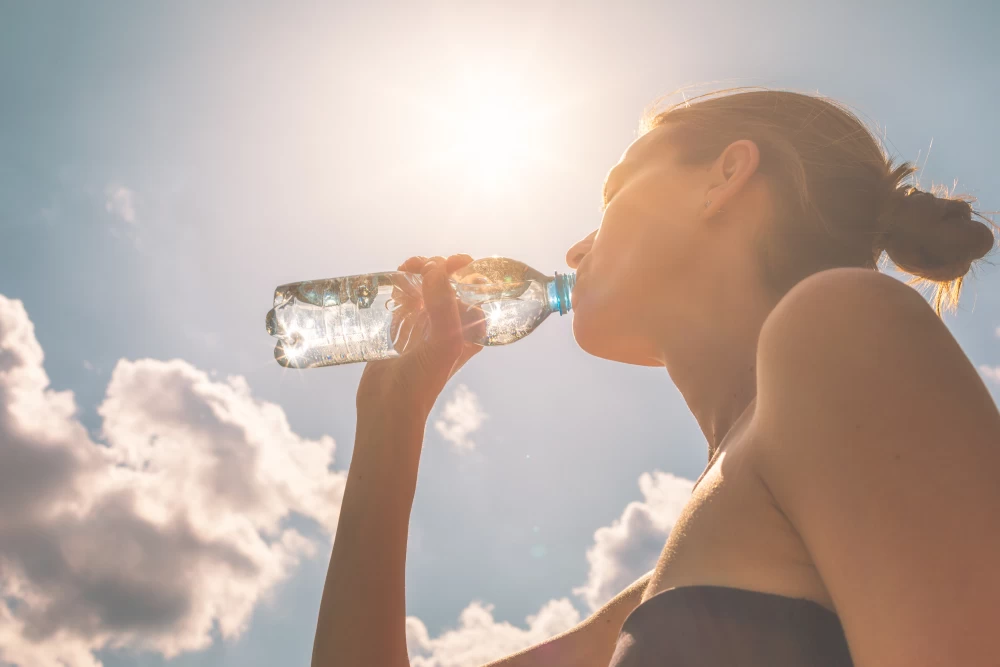
- 25th March 2023
Table of Contents
Fatty Liver Disease
Fatty liver disease is a condition characterized by the accumulation of fat in the liver, which can lead to inflammation and damage to the organ. While dietary changes are essential in managing this condition, it's also important to stay hydrated. Drinking enough water helps your body flush out toxins and waste products from your liver, which can reduce the burden on this vital organ. When you're dehydrated, your blood volume decreases, causing your liver to have to work harder to filter out toxins. This extra workload can cause further damage and inflammation in an already compromised liver. Additionally, staying hydrated can help prevent overeating or snacking as thirst is often mistaken for hunger. Choosing water over sugary beverages also helps reduce excess sugar intake that can contribute to fatty liver disease. In conclusion, staying hydrated is an integral part of managing fatty liver disease. Aim for at least eight glasses of water per day and limit sugary drinks that can exacerbate the condition. Consult with a healthcare professional if you have concerns about your hydration status or any other aspect of managing this disease.
Causes of Fatty Liver
Fatty liver disease, also known as hepatic steatosis, is a condition characterized by the accumulation of fat in the liver. While it's normal for the liver to contain some fat, an excessive amount can lead to inflammation and damage. One of the leading causes of fatty liver disease is consuming too much alcohol. Alcohol consumption leads to the deposition of fat in the liver cells and eventually leads to an inflamed liver. Another common cause of fatty liver disease is obesity. People who are overweight or obese tend to accumulate more fat in their livers than those with a healthy weight range. Increased levels of insulin resistance, which is frequently found in patients with obesity or type 2 diabetes, contribute significantly to fatty liver development. Finally, people suffering from dehydration may also be at risk for developing fatty liver disease due to insufficient water intake affecting basic metabolic processes such as glucose metabolism and lipid transport within the body.
Symptoms of Fatty Liver
Fatty liver disease is a condition characterized by the accumulation of fat in the liver cells. This condition can be asymptomatic and may go unnoticed until it progresses and causes serious damage to the liver. Some common symptoms of fatty liver disease include fatigue, weakness, abdominal pain or discomfort, unexplained weight loss, jaundice (yellowing of skin and eyes), swollen abdomen, nausea, and loss of appetite. In addition to maintaining a healthy diet and engaging in physical activity, hydration is an important factor in managing fatty liver disease. Drinking enough water helps prevent dehydration which can cause stress on the liver. Furthermore, adequate hydration aids in flushing out toxins from the body including excess fat that accumulates in the liver. It is recommended that individuals with fatty liver disease consume at least 8-10 glasses of water per day as part of their treatment plan. Other beneficial beverages include herbal teas such as dandelion root tea which has been shown to improve liver function and reduce inflammation. However, it is important to consult with a healthcare provider before making any significant changes to your diet or lifestyle for proper management of this condition.

Role of Hydration in Fatty Liver
Hydration plays a crucial role in the prevention and management of fatty liver disease. Dehydration can lead to an increase in the concentration of toxins within the liver, which impairs its function and increases the risk of developing fatty liver disease. On the other hand, adequate hydration helps flush out these toxins and promotes healthy liver function. Studies have shown that increasing water intake may help reduce the risk of developing fatty liver disease by decreasing inflammation and oxidative stress. Additionally, proper hydration can aid in weight loss efforts, which is another important factor in preventing and managing fatty liver disease. Overall, staying hydrated through regular water intake or other fluids like herbal teas or low-sugar juices can positively impact your overall health and prevent or manage conditions like fatty liver disease. It is recommended to drink at least 8 cups (64 ounces) of water per day to maintain adequate hydration levels for optimal health benefits.
Benefits of Increased Hydration
Increased hydration offers several benefits, especially for individuals with fatty liver disease. Adequate hydration helps to flush out toxins from the body and reduces the workload of the liver. When you drink enough water, it helps to improve blood flow in the body, which can decrease inflammation in organs such as the liver. Moreover, increased hydration can help to manage weight loss and reduce insulin resistance in patients with fatty liver disease. Water has zero calories and is a natural appetite suppressant that can keep cravings at bay. Drinking enough water also helps regulate blood sugar levels by keeping glucose concentrations controlled. Lastly, proper hydration plays a crucial role in improving overall health and reducing your risk of developing other conditions like kidney stones or urinary tract infections. It is advisable to consume at least eight glasses of water a day to maintain optimal hydration levels for a healthy body.
Ways to Increase Water Intake
1. Flavor your water: If you find the taste of plain water boring, try adding some flavor to it. You can add a slice of lemon or lime, cucumber, mint leaves, or berries to enhance the flavor and make it more refreshing.
2. Set reminders: It's easy to forget to drink enough water throughout the day. Setting reminders on your phone or computer can be a helpful way to remember to drink water at regular intervals.
3. Eat hydrating foods: Incorporating fruits and vegetables with high water content into your diet is an effective way to increase hydration levels. Examples include cucumbers, celery, watermelon, oranges, and strawberries.
Drinking enough water is essential for maintaining good health, especially for those with fatty liver disease. Dehydration can lead to complications such as increased insulin resistance and impaired liver function. By incorporating these simple tips into your daily routine and making conscious efforts towards increasing your water intake levels will help optimize liver function and overall health in the long run.
Conclusion
In conclusion, hydration is crucial in the management and prevention of fatty liver disease. Drinking enough water helps to flush out toxins and excess fats from the liver, reducing the risk of inflammation and damage. Additionally, staying hydrated can improve insulin sensitivity and promote weight loss, which are both important factors in managing fatty liver disease. It is recommended that individuals with fatty liver disease aim to consume at least 8-10 glasses of water per day. Other hydrating beverages such as herbal teas or coconut water can also be beneficial. However, it is important to limit or avoid sugary drinks and alcohol as they can worsen the condition. Overall, incorporating adequate hydration into a healthy lifestyle can have significant benefits for those with or at risk of developing fatty liver disease. Along with a balanced diet and regular exercise, staying hydrated is an essential component in maintaining optimal liver health.














